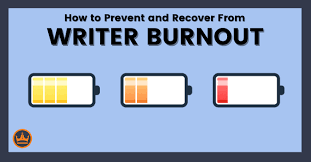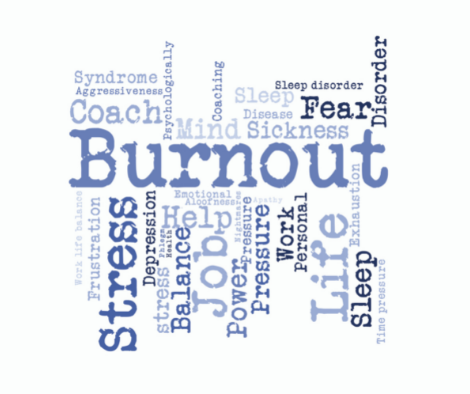
Table of Contents
- What is Burnout?
- How to Recognize Writer’s Burnout?
- Tips to Counter Burnout
- Conclusion
- FAQs
The struggle of balancing life, writing, and everything else can be very exhausting. If you feel like you’ve lost all your creativity and find it hard to come up with new material, the chances are that you have a writer’s burnout. Read below to know more about what it is and how you can overcome it.

What is a Burnout?

Burnout occurs when you are in a state of constant tiredness, physically, mentally, and emotionally, usually due to a lot of unaddressed stress. Burnout can significantly impact productivity, lead to depression, and in severe cases, can also result in extremely low immunity. Most writers experience this feeling at least once in their career as a result of constantly aiming for perfection, taking on too much work, or just due to fatigue from monotonous work. This is called a writer’s burnout, and if not timely acknowledged, it can lead to dire outcomes.
How to Recognize Writer’s Burnout?
A writer’s burnout can be described best as lacking inspiration and motivation, feeling continuous depletion, severe exhaustion, and the feeling of running empty. It is different from writer’s block, which means you are not getting ideas or the right inspiration to write. Many writers who do informative writing experience burnout from time to time. Here are some symptoms to help recognize burnout if you are a professional writer.
- Always feeling exhausted, even as soon as you wake up
- Stress eating, especially during your writing sessions
- No motivation to write anything, not even in your journal
- Constantly procrastinating
- Isolating yourself and not interacting with people as much as you used to
- Loss of creativity and finding all your work monotonous
- Extreme moodiness, aggression, forgetfulness, lethargy, or even depression
- You seem to fantasize a lot rather than encountering reality
- Frequent physical ailments like cold and fever
9 Tips to Counter Burnout
If you’ve been lacking the motivation to be your former writer self, the following tips might be of great help to counter writer’s burnout.
1. Acknowledge the problem
The first step to tackling an issue is recognizing it. Unless you realize why you’re facing burnout or the factors that demotivate you, you would never find a solution.
2. Clear your workspace
An untidy work environment is creativity’s worst enemy, and not coming up with new ideas can lead to burnout faster than you think.
3. Read books and continue writing
The more you read, the better your writing will be. However, if you’re going through burnout, it doesn’t mean you should completely stop writing. Continue as much as you can, even if it’s just your journal, and you’d soon find yourself getting better.
4. Find quality time for yourself
Burnout happens when you only concentrate on work and forget to look after yourself. Take some time off and go for a vacation, start a fun exercise routine, learn a new skill, make some diet and lifestyle changes, and meet more people.

5. Change your environment
Writers are mostly found holed up in their rooms or a quiet spot in some café. This isolation eventually leads to burnout and can be easily countered by changing the environment. You can try out the “workation” model, where you can work as you travel and explore different places.
6. Try a different mix
If you’re in the habit of writing one type of article or catering to a specific niche, try changing your writing style and niche. For example, if you write only fun and engaging content, you can perhaps try to work on different types of informative writing, which gives your brain a break without pausing work.
7. Seek external support
If nothing seems to work, try reaching out to a professional or fellow experienced writer for help. You never know whose advice may work wonders for you.
8. Make a schedule
Having a work routine is very crucial to keep your creative juices flowing. Too much work will always lead to burnout. Instead, make a schedule and stick to it. This will improve your efficiency, help your brain understand and release its creative flow at the right time, and give you enough space to relax and rejuvenate.
9. Pick a new hobby
A significant effect of burnout is that it kills creativity. Try out a new hobby that doesn’t relate to your work to rejuvenate yourself. This can be painting, singing, playing an instrument, or even playing intelligence-inducing sports like chess. Engaging in some new hobby will help you access the different parts of your brain, and you’ll be able to revive yourself much more quickly.
Conclusion
Writer’s burnout may be a serious issue, but you can overcome it by recognizing the signs on time and taking suitable measures to help deal with it. Remember always to be gentle towards yourself, don’t judge and self-sabotage your creativity, learn to take constructive criticism positively, and take a break from time to time. There is no end to creativity and self-care, and both must go hand in hand to avoid the highly dreaded writer’s burnout.
FAQs
As a freelancer, it’s important to create boundaries in the beginning itself to avoid any chances of burning out. Some other precautions you can take include understanding your capacity and not taking on too many projects, choosing your topics and clients wisely, maintaining a balance between work and personal life, taking frequent breaks, ensuring self-care, and socializing as much as you can.
If you’re experiencing severe burnout, the best thing to do right now is to take a break. Go out on vacation, enjoy time out with family and friends, and start paying more attention to your physical and mental well-being. You can also try out a new hobby to recharge your creativity. Only get back into writing when you start feeling like your former self. You must remember that burnout can happen again, and you must establish proper routines and follow the above-shared advice to avoid repetitive instances of getting exhausted.
Every writer can experience burnout. It doesn’t matter how experienced you are. What’s more important is recognizing the signs on time and knowing how to best deal with the situation.
Writers usually just communicate through the written word, which is not as quick as their brain works. Sometimes, too many ideas, overwhelming work, a drastic work schedule, a poor work environment, and an exhaustive routine can cause burnout. It is even worse for writers with full-time jobs since they often overwork themselves. This extra cognitive load is what leads to burnout.
The most common burnout symptoms include not feeling motivated to work, inability to put effort, constant exhaustion, and no interest in your favorite activities. There can also be a presence of physical ailments like dizziness, headaches, increased illness, heart palpitations, gastrointestinal pain, chest pain, and insomnia.
Latest Blogs
Explore how Google’s 2025 AI search updates triggered ranking chaos. Learn actionable strategies to adapt your SEO for AI Overviews, zero-click searches, and SERP volatility. Stay ahead now.
Learn how to rank on AI search engines like ChatGPT, Perplexity, and Gemini by optimizing your content for authority, structure, and relevance. Stay ahead in AI-driven search with this strategic guide.
Explore the best healthcare SEO services for your medical practice. Improve online visibility and effectively reach more patients in need of your services.
Get your hands on the latest news!
Similar Posts

B2C Marketing
5 mins read
Top Choices for Best Content Marketing Services in B2B Industries

Artificial Intelligence
5 mins read
How A Lead Generation Specialist Can Use AI-Powered Content Funnels to Drive Conversions

Artificial Intelligence
4 mins read